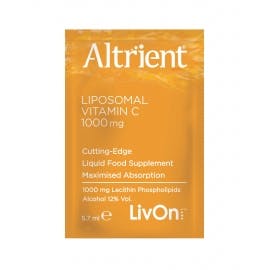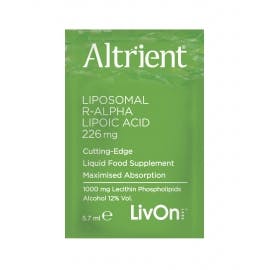Long haul health travel hazards
If sunshine, cocktails and delicious local cuisine are about to feature in your plans don’t forget to pack some vitamin C, Alpha Lipoic Acid and Glutathione.
The holiday season is well and truly underway and the prospect of long lazy days in the sun may soon become a reality for many of us. Although trips to France and Spain still appear to be amongst the favourite destinations, flights to long haul destinations have sky-rocketed in the last two decades. In 2017 the International Air Transport Association reported that a staggering 1.5 billion passengers flew to the Asia-Pacific region.
If you’re one of those adventurous travellers, your expectations for the perfect holiday destination may be even higher than usual, especially if you’ve been planning and looking forward to it all year. You want to make sure your holiday is the blissful getaway you’ve been anticipating and not a holiday horror story!
Although cheaper flights have made a broader range of holiday destinations accessible to a greater number of people, trips to far flung places often bring more worries than usual especially in terms of health.
To put your mind at ease we’ve got some great solutions…
Travel anxiety
The prospect of travelling somewhere new should be exciting but there are a percentage of people that find the whole experience traumatising. The queuing, security checks, noise, heat, delays, worry about baggage allowance, bored kids etc. can trigger a roller coaster of stress and anxiety and may leave you feeling exhausted by the time you reach your destination.
Tackling stress can be helped by including lots of magnesium-rich foods in your diet in the run-up to your holiday. Magnesium contributes to the normal functioning of the nervous system and normal psychological function, so it may offer great support, just when you need it. For extra magnesium include:
- Leafy greens
- Pumpkin seeds
- Almonds, cashews and Brazil nuts
- Fresh tuna
- Beans
- Lentils
- Whole grains
Deep Vein Thrombosis (DVT)
DVT is a blood clot that forms in a vein deep inside the leg. In normal circumstances blood flows quickly through veins due to leg movements. Muscles in the legs squeeze the veins, preventing the likelihood of clots.
The cramped environment on an aeroplane limits the amount of movement possible and may cause circulation to become sluggish, or it may damage blood vessel walls which could lead to an increased tendency for a clot to form.
The risk of developing a clot is generally low, but it is higher in certain circumstances i.e.:
- If you smoke
- You are over 40
- On the pill or HRT
- Overweight
- Pregnant
- Have varicose veins
- Recently had surgery
Moving around where possible during a flight is recommended, drinking lots of water, avoiding alcohol and wearing compression stockings can also improve circulation.
Keeping the blood vessels strong and healthy helps too. Making sure you eat plenty of vitamin C rich fruit and vegetables is one of the ways you can help to maintain blood vessels because vitamin C contributes to normal collagen formation for the normal function of blood vessels.
Jet lag
Before you’ve even arrived at your destination you must consider how you are going to combat the effects of jet lag. This is a common long-haul travel complaint and can last for several days.
Overwhelming fatigue and sleepiness are the most common side-effects of jet lag, so apart from a good night’s sleep you also need a quick injection of vitality in order to make the most of your holiday.
If you manage to eat lots of magnesium-rich foods you might fare better than others, because magnesium contributes to a reduction of tiredness and fatigue as well as contributing to normal energy-yielding metabolism.
However, if the hotel menu isn’t offering much in the way of green leafy vegetables or nuts and seeds, taking a high quality well-absorbed magnesium supplement can offer valuable nutritional support.
Traveller’s tummy
An estimated 30-70% of travellers who visit high-risk parts of the world suffer from traveller’s diarrhoea. Contaminated water is usually the culprit in countries that may not have the high level of sanitation we enjoy in Europe.
Bottled water is an easy solution, plus you should remember not to clean your toothbrush in tap water, eat salads rinsed in local water or drink anything with ice in it.
it’s also worth filling up on fibre rich foods so that you can encourage the healthy bacteria in your gut to flourish. 80-90% of traveller’s diarrhoea is due to pathogenic bacteria, so crowding out troublesome bacteria with beneficial bacteria is the best strategy.
Fruit and vegetables are great sources of fibre as are beans, legumes and whole grains. Fermented foods like sauerkraut and live yoghurt also provide the body with healthy bacteria.
Don’t forget that diarrhoea combined with too much sun, heat and alcohol can leave you significantly dehydrated so it pays to drink plenty of water and add an electrolyte rehydration drink to help replace lost electrolytes.
You could even make your own by adding some magnesium and a pinch of salt to orange juice. Research shows that magnesium contributes to electrolyte balance.
Sun burn
Investing in a good sunscreen is a must if you are heading for some hot summer sun, but to really give your skin a helping hand top up with antioxidants before you go. Fruit and vegetables that are rich in vitamin C and other antioxidants are the ideal foods to include in your holiday preparation plan.
Vitamin C is particularly helpful because it contributes to normal collagen formation for the normal function of skin as well as contributing to the protection of cells from oxidative stress.
Whilst you’re on holiday, the availability of fresh fruit and vegetables might be limited, so taking a good range of high quality well-absorbed supplements is a good idea. Vitamin C and Alpha Lipoic Acid are great choices in these circumstances and if the cocktails are flowing, glutathione can also offer valuable nutritional support.
Good nutrition and planning ahead is a good way to ensure a happy, healthy holiday.
Author - Jacqueline Newson BSc (Hons) Nutritional Therapy
REFERENCES
- Gate AK, Navae S and Roy AK. Serum calcium, magnesium and potassium in acute diarrhoea patients coming to pravara rural. Int. j. clin. biomed. res. 2018;4(2):7-11.
- https://www.forbes.com/sites/ericrosen/2018/09/08/over-4-billion-passengers-flew-in-2017-setting-new-travel-record/#26151c63255b. [Accessed 24.5.19.]
- https://www.cdc.gov/ncbddd/dvt/travel.html. [Accessed 24.5.19]
- https://www.nhs.uk/live-well/healthy-body/prevent-dvt-when-you-travel/. [Accessed 24.5.19]






